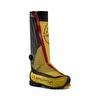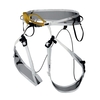Pietro Dal Prà - the mountain from all perspectives

 1 / 4
1 / 4 arch Pietro Dal Prà
arch Pietro Dal Prà
Pietro Dal Prà is an old friend; since his teenage years he's been a fixed presence at Lumignano, near Venice, Italy.
I've always been convinved that "Mare allucinante", a difficult 8b+ freed by him when he was just 16 years old, has a very speciale rapport with this "specialiste".
He has now devoted his life to his passion; based in Cortina he works as a Mountain Guide and still finds time to make a name for himself climbing hard routes alone on the massive Dolomites walls.
We met up with him at home to speak about climbing, climbers and the mountain from all different points of view...
What do you mean by a "complete" climber?
Someone who excels in all different mountain environments, someone who feels just at home on granite as on limestone, on single pitches as well as multi-pitches, on big walls or boulders. This, aside from the number of meters or the danger of the pitch, is what I mean by a "complete" climber.
In Yosemite in 1997 I did Salathè in two days. The next day I climbed Midnight Lightening. Then, three days later, I did my hardest onsight in Tuolomne Meadows (Clash of the Titans, 5.13b), which has bolts but also requires nuts for protection.
That, for me, is "complete" climbing
What does climbing mean to you?
I'm in love with climbing because of the beauty of the moves, because of the sensations it gives me and the feeling of freedom I experience. And this is even more the case, the higher up I am! There are many single elements which, put together, make this sport unique: the actual physical movements, the fascination surrounded with achieving a goal, the natural beauty of the climbing areas, and so on ...
After 15 years of climbing, I continue to discover something previously unknown, unimagined. It's incredible! So every time I go climbing I expect something new, unexplored - even when I repeat the same routes in my local crag. Skiing doesn't give me this sensation - only climbing does!
Some may argue that this is because climbing is my passion, but I'm convinced that, objectively speaking, climbing offers something more - how else could you explain why so many people really live for this sport.
That what pushes me to climb and do dangerous routes is also, in part, an ideal. The need to live experiences which in some way are greater than everyday life. The need, every now and then, to scream, to be, to feel profoundly different, on a higher plane. This is certainly the big psychological difference between a sports climber and a "complete" climber.
Can you give us some examples of "complete" climbers?
I have great respect for Yuji Hirayama as a sports climber - at the moment he's the best. He wins the World Cup, is really strong at bouldering and all types of sports routes. And he trained for two years to do Salathè onsight and did it in indisputable style, probably one of the greatest achievements in climbing!
Another is Lynn Hill, who excels all-round, too. Her ascent of the Nose was an incredible feat. The idea of climbing all 35 pitches in a single push was inspirational. Yuji tried to repeat this but, even though he's stronger, he failed. For once, morphological factors played an important role.
A third is Beat Kammerlander; I went to the Rätikon with him last year. It's an incredible place, a suspended valley. Beat's one of the few to do certain things - for that he's really impressive. I tried his Silbergeier (multi-pitch 8b+ climbed from the ground up) which I'd love to do next summer. There are enormous run-outs and 20m falls! You really need to able to climb to do his routes - you need nerves of steel, stamina and great technique. Perhaps this too is what "complete" climbing is all about.
Above all though, I have the greatest respect for all those who try to bring high technical standards into the mountain environment; there it's not always possible to eliminate the risk factor - especially in the Dolomites.
Do you have any projects, any dreams?
When I think about climbing, I always dream about the mountains, not the summit itself, but the complete experience. This is partly because they've always been the most rewarding, and partly because I devote less time to them. I dream about massive walls, like returning to Patagonia, but certainly not to put up something extreme.
Time, money and finding the right partners are always a problem, but luckily there are still some great things left to do in the Dolomites and the Alps. I bought a drill last year, after my Rätikon experience; it'd be great to open some routes in a similar style.
What lifestyle does a climber lead?
A passion can make you miss out on a lot of things. Every now and then I ask myself if it's really worth it, because living exclusively for one goal can be extremely limiting. And also because you never live in a calm, relaxed way! You may be at work, have different obligations, but your mind continuously drifts elsewhere…
This sport is such a driving force that it can take you away from what is regarded to be the everyday, real dimension - all passions which have some artistic streak have this effect. But it's important, and this holds true for all climbers, not just those training on plastic, to be conscious of the fact that outside this strong, personal dimension there lies the rest of the world. One must realise this, otherwise one risks becoming inward looking, "sad" characters.
And what about solos?
Perhaps I'd do some things alone again, but certainly not as extreme as before. I'm sure I reached my absolute limit soloing which, in a mountain environment, is already too much!
Psychologically speaking these routes are almost too severe. On Zauberlehrling, on Cima Scotoni, I didn't exactly cry, but that degree of emotion was certainly there. I was on top form and extremely motivated and still I was confronted with the thought "what now? this is it!"
I now prefer to climb not alone but with a partner, someone I respect and trust, also because a given crises is never that serious when it can be shared.
Has the spirit of alpinism changed in any way?
In the last couple of years almost all sports, not just climbing, have become less charismatic, they've lost their heroic aspects. Evolution is no longer connected exclusively to the mental ability of an individual - it is now the sportsman, as a trained sports machine, that has become the driving force behind innovation and change. It's so much easier to improve if you're told exactly what to do, how and when. But individuals and their dreams have no chance of developing and establishing themselves. This is the greatest danger nowadays.
Similarly, the focus in alpinism has shifted considerably. Everything is much more normal than 10 years ago, role models whom to aspire to are now few and far between.
It's true that there are more facets to our sport and that it's even possible to climb in Palermo, but it's also true that things have levelled out, that they've lost their flavour.



 Copia link
Copia link
























